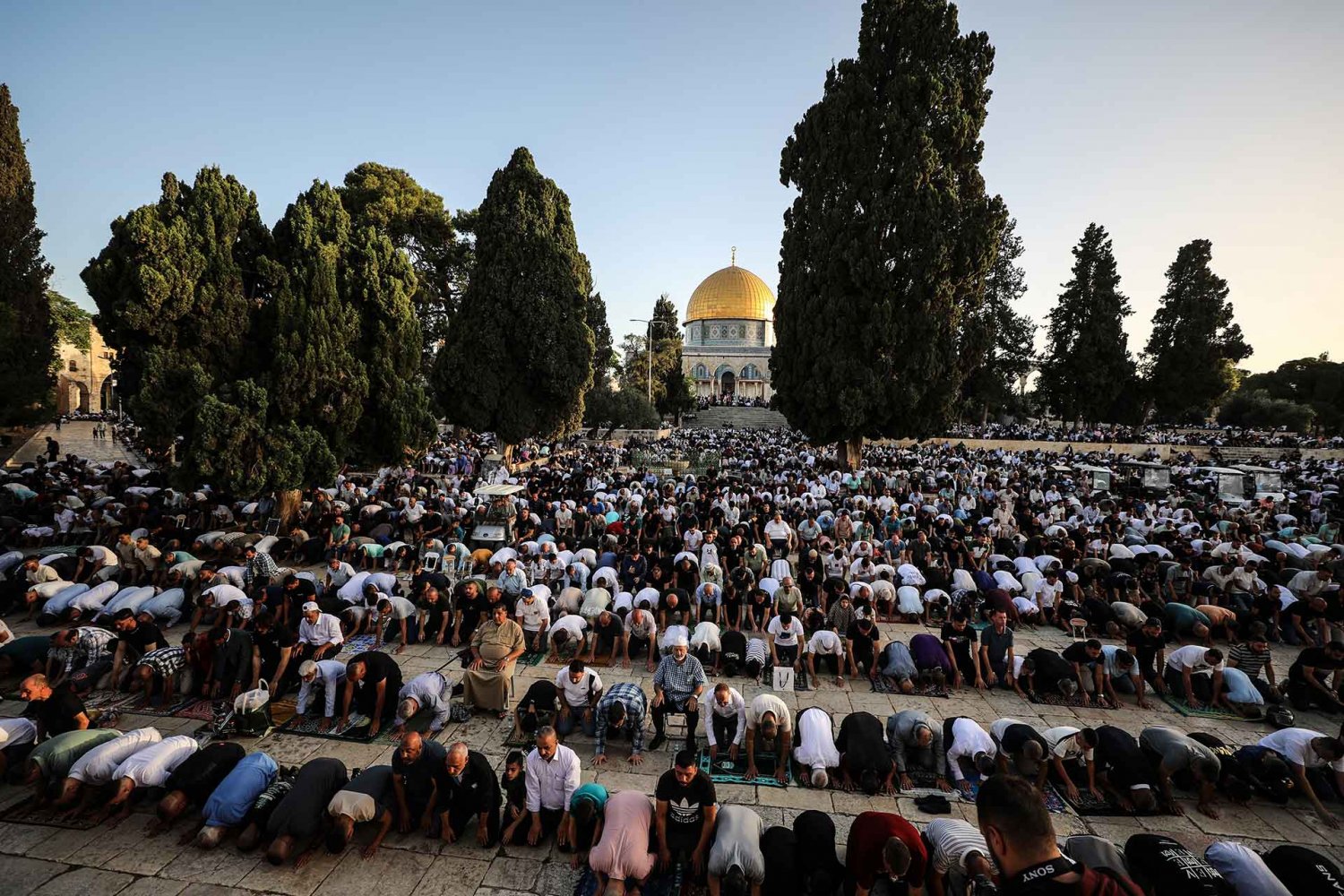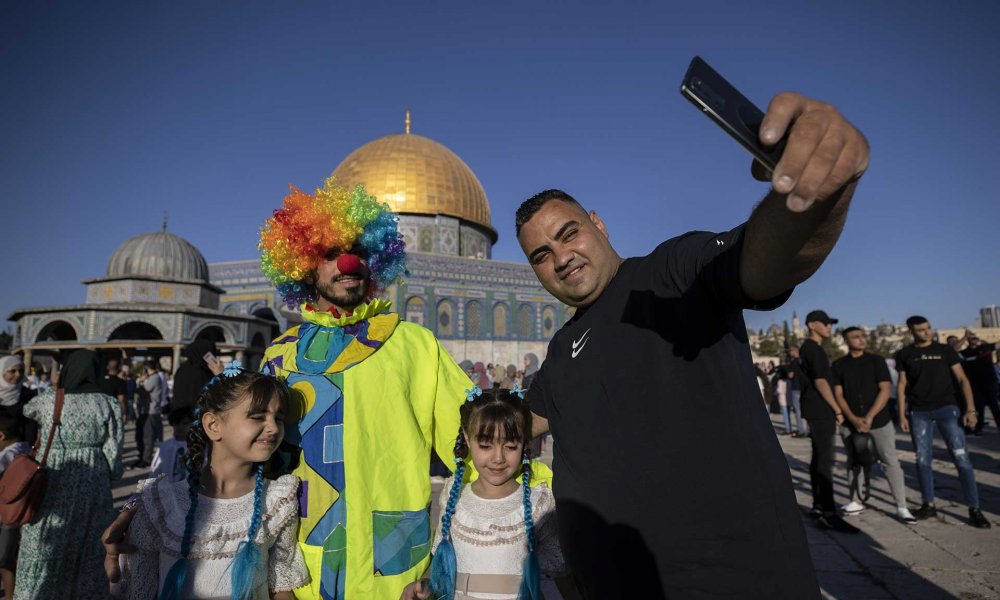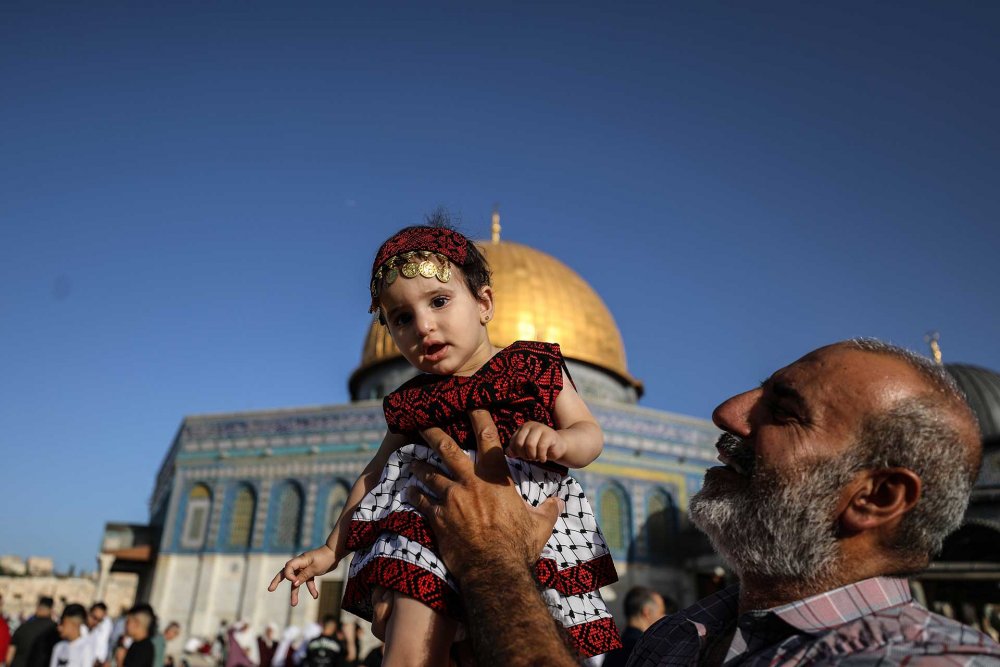Fatima Khader, 67, stood outside Damascus Gate watching people enter and leave the Old City of Jerusalem. Dressed in a beautiful embroidered traditional dress, she felt sad that so few visitors were coming to Jerusalem this year during this particular holiday. She remembered last year’s Eid al-Adha, when the plaza and steps outside Damascus Gate were full of children in new colorful clothes, running around and buying colored balloons or toys, as well as many people simply going about their day.
She also remembers the entertainers who were performing for the kids, which gave the holiday a special feel.
Fatima is the daughter of the Old City of Jerusalem, and she is always present, whether at protests or on the holidays. This Eid al-Adha, she was interviewed on several Arabic TV stations.
And she spoke to Jerusalem Story too. She observed that this year’s Eid al-Adha was not as festive as in years past. “Our Eid is our Aqsa [Mosque], and that is why we come here, for spiritual reasons, but that is all. This season has none of the factors that give joy. We are not well because Gaza is not well. How can we enjoy Eid when we are only allowed to enter al-Aqsa to pray and nothing else?”1
Khalil Abdullah, 28, a Palestinian who lives in al-Tur neighborhood on the Mount of Olives, was taking his young son Omar on a tour of the Old City of Jerusalem on the second day of Eid al-Adha. Most of the shops were closed, but he kept on walking. “I wanted my son to know that people are expressing solidarity with Gaza. But even so, we insist on wearing new clothes and visiting al-Aqsa [Mosque], because we never know when we will be able to visit again.”2 Abdullah told Jerusalem Story that al-Aqsa Mosque “is our address, and I wish everyone who can come to al-Aqsa on all the days of Eid and bring their children with them. There are indeed no signs of happiness on this holiday, but I also told Omar that the war will end, and things will go back to normal, and we have to make sure we protect our mosque.”
Hajj Usama Abdel-Ghani, 75, a resident of Haret al-Sa‘diyya in the Old City, insists that most people are staying at home and not observing the usual holiday traditions. “People are not in a mood to celebrate. The only thing we do is visit our relatives and the family graves in the cemetery and then we go back home until Eid is over.”3
When Hajj Usama visited his daughter in Ramallah, he noticed that the city had some outward signs of celebration. “Wallah, it is a shame,” he said. “It is as though the city is not even in Palestine.”
One of the many changed traditions in Jerusalem is cancellation of the traditional Friday market fair, which used to be a huge market for the purchase of livestock. This was a special location for the sale of sheep to be sacrificed during Eid al-Adha, the feast of the sacrifice. People would come from all over the West Bank and Gaza to pray in al-Aqsa Mosque on Fridays and to find the right sheep to take to the slaughterhouse. The market was the biggest in all of Palestine and featured all kinds of animals, including camels. It used to take place in the area directly adjacent to the Old City wall, across the street from the Rockefeller Museum all the way to Lions’ Gate. But the Israeli authorities banned the market in 1990. That area has now become part of religious Jewish biblical gardens. Israeli authorities temporarily suspended the work on the so-called biblical garden during the Eid al-Adha holiday, but this suspension will end after the Muslim holiday is over, and the paving of the grounds to make room for the Judeo-centric biblical garden will commence.
Jerusalem suffers in silence, as everyone is following hour by hour the war in Gaza but at the same time waiting for the four-day Eid holiday to be over so the tiring routine of normal life can resume.
For Palestinian Jerusalemites, “normal life” means a resumption of the bureaucratic fights with the Israeli institutions which have made life hell. All Israeli institutions share the goal of further Judaizing Jerusalem and pushing Palestinians to leave the city. Extremist Jewish settler groups all work synergistically with the Israeli Jerusalem municipality toward this end.
Notes
Fatima Khader, interview by the author, June 17, 2024.
Khalil Abdullah, interview by the author, June 17, 2024. All subsequent quotes from Abdullah are from this interview.
Hajj Usama Abdel-Ghani, interview by the author, June 17, 2024. All subsequent quotes from Abdel-Ghani are from this interview.



